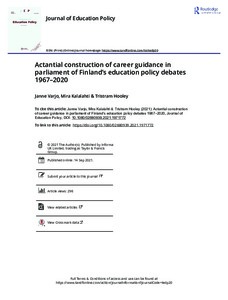Actantial construction of career guidance in parliament of Finland’s education policy debates 1967–2020
Varjo Janne; Kalalahti Mira; Hooley Tristram
https://urn.fi/URN:NBN:fi-fe2021110253330
Tiivistelmä
In this paper we examine the objectives and meanings of the career guidance provided in comprehensive education as set out in discussions in the Parliament of Finland. We approach the topic through an exploration of parliamentary sessions concerning three major legislative proposals for reforming compulsory education in Finland.
The premise is that the parliamentary discussions concerning guidance provided in comprehensive education reflect the rationalities that underpin guidance in different eras in Finland and elsewhere. Examining these rationalities provides a way to explore the principles which frame career guidance policy in Finland. Using the
actantial model as a methodological tool, the analysis aims to discover the actantial positions in the parliamentary discussions and the interactions that emerge between these.
The various actantial narratives demonstrate the way in which guidance is influenced by wider ideological trends. The actantial analysis portrays a shift from the more structural corporatist approaches of the 1960s when the object of guidance was to fulfil the needs of society, towards more third way individualism in
1990s. The current reform of 2020 to extend compulsory education and reinforce guidance may represent some return to more structural approaches.
Kokoelmat
- Rinnakkaistallenteet [27094]
